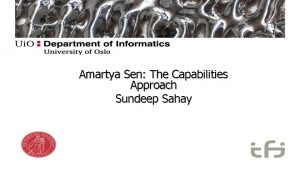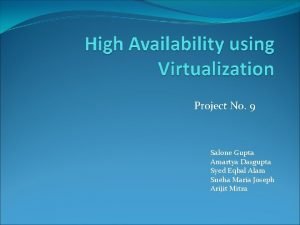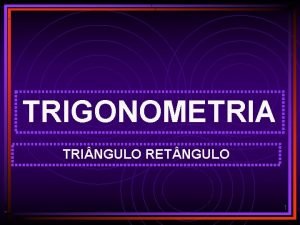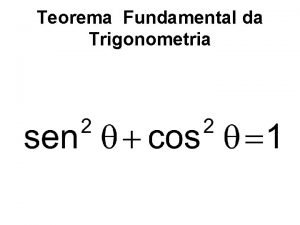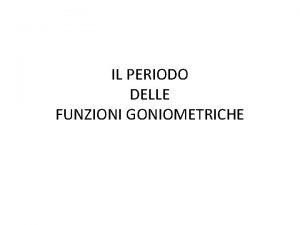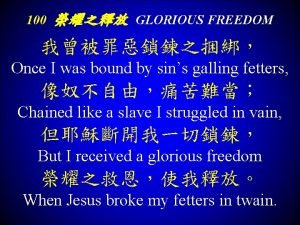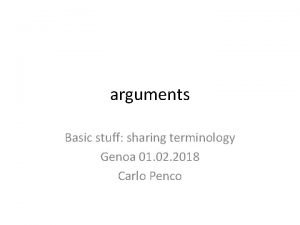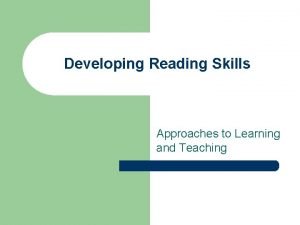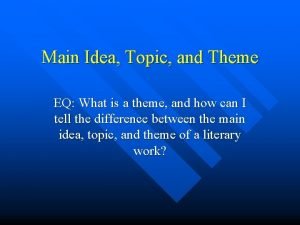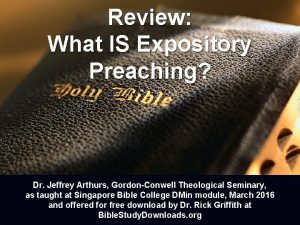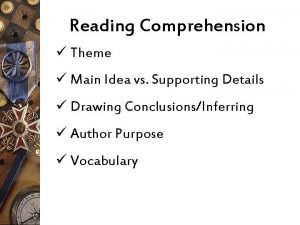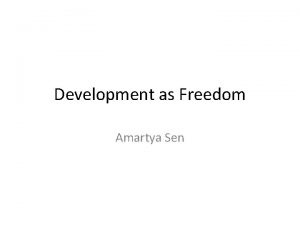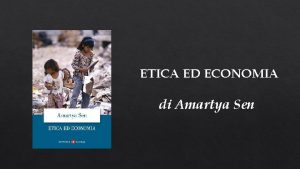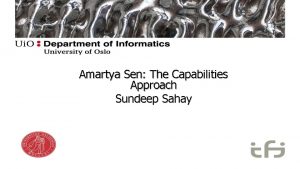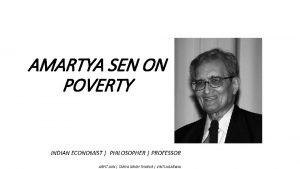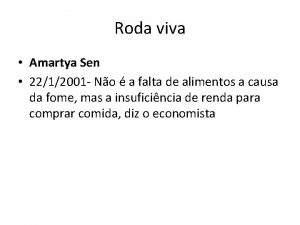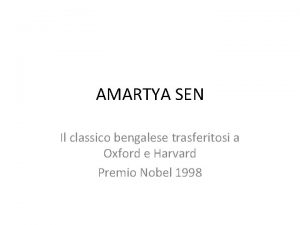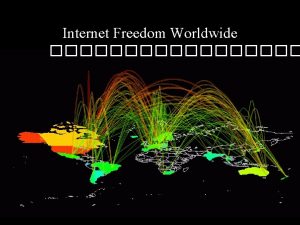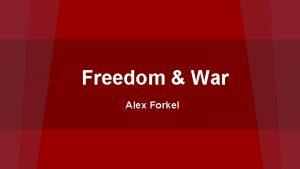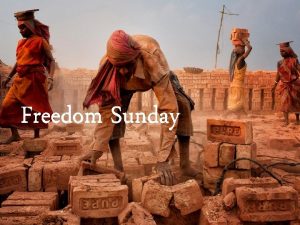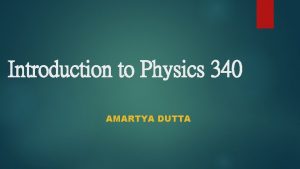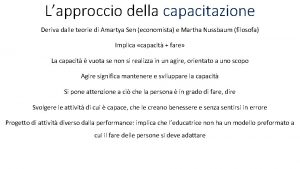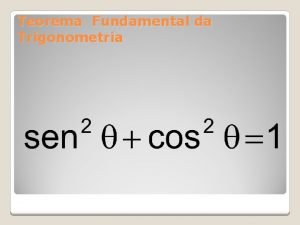The Idea of Freedom Reading Amartya Sen from










































- Slides: 42

The Idea of Freedom: Reading Amartya Sen from a Catholic perspective Dr Mark Hayes (St Hilda Chair in Catholic Social Thought and Practice, Durham University) Professor Stuart Corbridge (Vice-Chancellor and Warden of Durham University ) Rev Dr Augusto Zampini Davies (Theological Advisor, CAFOD; Honorary Fellow, Durham University) Dr Séverine Deneulin (Associate Professor in International Development, University of Bath)

Trade with the gifts God has given you. Bend your minds to holy learning that you may escape the fretting moth of littleness of mind that would wear out your souls. Brace your wills to action that they may not be the spoil of weak desires. Train your hearts and lips to sing which gives courage to the soul. Being buffeted by trials, learn to laugh. Being reproved, give thanks. Having failed, determine to succeed.

A C Pigou 1877 -1959



Vilfredo Pareto 1848 -1923

Kenneth Arrow 1921 -

Amartya Sen in 2010

The Idea of Freedom: Reading Amartya Sen from a Catholic perspective Dr Mark Hayes (St Hilda Chair in Catholic Social Thought and Practice, Durham University) Professor Stuart Corbridge (Vice-Chancellor and Warden of Durham University ) Rev Dr Augusto Zampini Davies (Theological Advisor, CAFOD; Honorary Fellow, Durham University) Dr Séverine Deneulin (Associate Professor in International Development, University of Bath)

Development as Freedom “no society can surely be flourishing and happy, of which the far greater part of the members are poor and miserable. It is but equity, besides, that they who feed, clothe and lodge the whole body of the people, should have such a share of the produce of their own labour as to be themselves tolerably well fed, clothed and lodged”. (Adam Smith: The Wealth of Nations) Stuart Corbridge

Amartya Kumar Sen 1. 1933 Dhaka, educated Santinikiten, Presidency College, Calcutta, and Cambridge. 2. Phenomenal early career (Chair in Economics at Jadavpur University by age 23), later built upon via DSE, LSE, Oxford, Harvard, Cambridge (Nobel in 1998), and now Harvard again. 3. Economics, moral philosophy and huge range across ‘development studies’, India. 4. Events: GBF; Partition (Kader Mia); Ken Arrow


Substantive Famine: from FAD to exchange entitlements; “no famine has ever taken place in the history of the world in a functioning democracy” (DAF, 16). Gender: 100 million missing women. Most women do not enjoy the same substantive freedoms (or capabilities)as men – and not just in poor countries. HDI: versus crude focus on GDP per capita Secularism and Tolerance: Hindutva and public intellectuals such as Ashis Nandy and Partha Chatterjee

Development as Freedom Ø The bases of Sen’s account of development as freedom are to be found in his understanding of the proper spaces for economic, political and moral evaluation. Ø Sen’s analyses of poverty and famines, or of the importance of capabilities in securing substantive human freedoms, follow directly from his critique of contending accounts of the meaning of development and the measurement of economic success.

One possible space… Sen has objected to utilitarianism on the ground that it provides for a space of economic evaluation which is insensitive to human difference and thus to the distinct needs and capabilities of individual human agents. As he put it in the Radcliffe Lectures of 1972: “The trouble with this approach is that maximizing the sum of individual utilities [pleasure, happiness, welfare] is supremely unconcerned with the interpersonal distribution of that sum. This should make it particularly unsuitable for measuring or judging inequality”

Also opposes Libertarianism and market fundamentalism “The proposal of a consequenceindependent theory of political priority is afflicted by considerable indifference to the substantive freedoms that people end up having – or not having. We can scarcely agree to accept simple procedural rules irrespective of consequences – no matter how dreadful and totally unacceptable these consequences might be for the lives of the people involved” (ibid).

Edging away from John Rawls For Rawls, all humans should be endowed with a minimum set of primary goods (including education and an income) subject only to a prior rule that would guarantee equal personal liberties. Sen argues that a strict equation cannot be drawn between primary goods and well-being because the former cannot always be converted into the latter. “For example, a pregnant woman may have to overcome disadvantages in living comfortably and well that a man need not have, even when both have exactly the same income and other primary goods” (IR, 27).

The punchline - 1 Ø “Development consists of the removal of various types of unfreedoms that leave people with little choice and little opportunity of exercising their reasoned agency. The removal of substantial unfreedoms … is constitutive of development. However, for a fuller understanding of the connection between development and freedom we have to go beyond this basic recognition (crucial as it is). The intrinsic importance of human freedom, in general, as the preeminent objective of development is strongly supplemented by the instrumental effectiveness of freedoms of particular kinds to promote freedoms of other kinds. The linkages between different types of freedoms are empirical and causal, rather than constitutive and compositional”

Punchline - 2 “For example, there is strong evidence that economic and political freedoms help to reinforce one another, rather than being hostile to one another (as they are sometimes taken to be [though see III below]). Similarly, social opportunities of education and health care, which may require public action, complement individual opportunities of economic and political participation and also help to foster our own initiatives in overcoming our respective deprivations. If the point of departure of the approach lies in the identification of freedom as the main object of development, the reach of the policy analysis lies in establishing the empirical linkages that make the viewpoint of freedom coherent and cogent as the guiding perspective of the process of development” (DAF, xii).

The good life … DAF aims to reconcile difference and universalism: we all define the good life differently and according to our needs, but for anyone to be capable of leading a good life certain minimum standards must be met. For Sen, these include both negative and positive freedoms, including the right to participate in markets.

Functionings and capabilities Ø ‘Functionings’ refer to the things that a person may value doing or being, and thus denotes a freedom to achieve a certain lifestyle (after DAF, 75). ‘Capabilities’ refer to the sets of resources (physical, mental and social) that a person might command which give rise to various ‘functionings’. Ø As Sen points out: “The evaluative focus [space] of this ‘capability approach’ can be either on the realized functionings (what a person is actually able to do) or on the capability set of alternatives she has (her real opportunities). The two give different types of information - the former about the things a person does and the latter about the things a person is substantively free to do” (ibid. , emphasis in the original).

The Idea of Freedom: Reading Amartya Sen from a Catholic perspective Dr Mark Hayes (St Hilda Chair in Catholic Social Thought and Practice, Durham University) Professor Stuart Corbridge (Vice-Chancellor and Warden of Durham University ) Rev Dr Augusto Zampini Davies (Theological Advisor, CAFOD; Honorary Fellow, Durham University) Dr Séverine Deneulin (Associate Professor in International Development, University of Bath)

Amartya Sen’s capability approach: contributions to CST Augusto Zampini-Davies 26 th February 2016 Durham University

Structure of the paper • Introduction – Reasons for mutual enrichment between CST and CA • Contributions from CA to CST – Integral development: economics & gender – Integral ecology: public reasoning processes (dialogue) – Integral spirituality: participation & agency (social & doctrinal) • Contributions from an alliance between CST-CA – – A narrative beyond utilitarianism Inspiring narratives for actual human flourishing Economics of inclusion Diálogo y Alborozo (Luis Seoane, 1970)

Tensions Sen’s CA • Emphasis on the individual • The good undefined • Total openness for list of capabilities • Consequentialism • Primacy of reason • Optimism on rationality CST • • • Emphasis on relationships Nature of the good Basic human needs Teleologism Reason & faith Notion of sin

Main reasons for a CA-CST alliance 1. Starting point (Bottom-up approach): the poor & injustices 2. Basis for development: freedom & relationality 3. Understanding of human flourishing and universal development: integral 4. Idea of justice: practical (virtue), gradual & imperfect (eschatological), democratic (dialogical) 5. Approach to economics: ethical & engineering 6. Critical analysis of utilitarianism, libertarianism & communism, and globalisation

7. No specific political economic solution, on their own. Engagement does matter CA The CA does not offer an agenda for social transformation. It is an openended language ‘with various bits to be filled in’ (Sen 1993: 48) CST ‘The Church does not presume to settle scientific questions… but can encourage an honest and open debate so that particular ideologies will not prejudice the common good (LS 188)

Contributions from CA to CST • Integral development: for all dimension of the person, for all persons. • Integral Ecology: cry of the earth and cry of the poor. Interconnectedness. • Integral spirituality: integrating relationships with other people, other creatures, the earth, and God.

Contributions CA to CST (II) • Integral development: economics and gender • Integral Ecology: process of dialogue • Integral spirituality: agency & participation, practical & doctrinal

Integral Human Development All the person All persons

Integral ecology • • “Positive judgement” Aims at a new long-term and comprehensive (integral) view, integrating economic, cultural, political, social and ecological issues. Calls for a united vision – not competing needs or solving one issue first without looking at others Based on a refreshed anthropology (The Gospel of Creation) Socio-environmental (cry of the earth and cry of the poor) Ecology of daily life & macroeconomics; common good & human dignity; cultural ecology Through DIALOGUE (action)

Integral spirituality: agency & participation. Personal & civic love • Participation in defining and deploying development • Participation in the process of public dialogue • Participation in the doctrinal development of CST



The Idea of Freedom: Reading Amartya Sen from a Catholic perspective Dr Mark Hayes (St Hilda Chair in Catholic Social Thought and Practice, Durham University) Professor Stuart Corbridge (Vice-Chancellor and Warden of Durham University ) Rev Dr Augusto Zampini Davies (Theological Advisor, CAFOD; Honorary Fellow, Durham University) Dr Séverine Deneulin (Associate Professor in International Development, University of Bath)

Contributions of CST to Sen’s work Séverine Deneulin 26 th February 2016 Durham University

Focus on 3 contributions CST can offer to CA • A more relational anthropology • A more realistic account of human failure (‘structural sin’) • A stronger motivation for ‘making the world a little less unjust ‘ (Sen 2009: 25)

Intro: What is capability approach? • • Sen’s unwillingness to have things settled Not a social theory Not a theory of justice A moral approach to assess situations from the perspective of freedom (wellbeing and agency)

Relational anthropology • Ethical individualism and beyond • Individual dignity and the common good • Evaluation of states of affairs in how well individuals are doing is not enough

Structural sin • Exercise of human agency can lead to structural sins. • From personal to structural • Community conversion (LS)

Motivation • Agency and responsibility • Awareness of interconnectedness • Attitudes to counter utilitarian mindset

The Idea of Freedom: Reading Amartya Sen from a Catholic perspective Dr Mark Hayes (St Hilda Chair in Catholic Social Thought and Practice, Durham University) Professor Stuart Corbridge (Vice-Chancellor and Warden of Durham University ) Rev Dr Augusto Zampini Davies (Theological Advisor, CAFOD; Honorary Fellow, Durham University) Dr Séverine Deneulin (Associate Professor in International Development, University of Bath)
 Capability approach
Capability approach Amartya dasgupta
Amartya dasgupta Sen(a+b)+sen(a-b)
Sen(a+b)+sen(a-b) Bayram özünü bildi bileni anda buldu
Bayram özünü bildi bileni anda buldu Tabela de entes trigonométricos
Tabela de entes trigonométricos Periodo funzione sinusoidale
Periodo funzione sinusoidale Glorious freedom wonderful freedom
Glorious freedom wonderful freedom Positive freedom negative freedom
Positive freedom negative freedom Pre reading while reading and post reading activities
Pre reading while reading and post reading activities Main ideas examples
Main ideas examples Contoh controlling idea
Contoh controlling idea Idea subject
Idea subject What is central idea mean
What is central idea mean Irrelevant sentence in a paragraph
Irrelevant sentence in a paragraph Expository preaching vs. exegetical preaching
Expository preaching vs. exegetical preaching Nota penanda wacana
Nota penanda wacana Reading comprehension main idea and supporting details
Reading comprehension main idea and supporting details Cái miệng xinh xinh thế chỉ nói điều hay thôi
Cái miệng xinh xinh thế chỉ nói điều hay thôi Các châu lục và đại dương trên thế giới
Các châu lục và đại dương trên thế giới Bổ thể
Bổ thể Từ ngữ thể hiện lòng nhân hậu
Từ ngữ thể hiện lòng nhân hậu Tư thế ngồi viết
Tư thế ngồi viết Thế nào là giọng cùng tên?
Thế nào là giọng cùng tên? Thể thơ truyền thống
Thể thơ truyền thống Hát lên người ơi
Hát lên người ơi Hổ đẻ mỗi lứa mấy con
Hổ đẻ mỗi lứa mấy con đại từ thay thế
đại từ thay thế Diễn thế sinh thái là
Diễn thế sinh thái là Vẽ hình chiếu vuông góc của vật thể sau
Vẽ hình chiếu vuông góc của vật thể sau Làm thế nào để 102-1=99
Làm thế nào để 102-1=99 Cong thức tính động năng
Cong thức tính động năng Tỉ lệ cơ thể trẻ em
Tỉ lệ cơ thể trẻ em Thế nào là mạng điện lắp đặt kiểu nổi
Thế nào là mạng điện lắp đặt kiểu nổi Lời thề hippocrates
Lời thề hippocrates Vẽ hình chiếu đứng bằng cạnh của vật thể
Vẽ hình chiếu đứng bằng cạnh của vật thể Quá trình desamine hóa có thể tạo ra
Quá trình desamine hóa có thể tạo ra Kể tên các môn thể thao
Kể tên các môn thể thao Hát kết hợp bộ gõ cơ thể
Hát kết hợp bộ gõ cơ thể Sự nuôi và dạy con của hươu
Sự nuôi và dạy con của hươu Các loại đột biến cấu trúc nhiễm sắc thể
Các loại đột biến cấu trúc nhiễm sắc thể Biện pháp chống mỏi cơ
Biện pháp chống mỏi cơ độ dài liên kết
độ dài liên kết Trời xanh đây là của chúng ta thể thơ
Trời xanh đây là của chúng ta thể thơ
